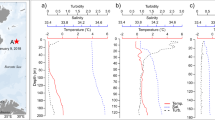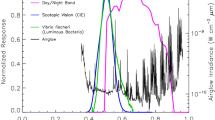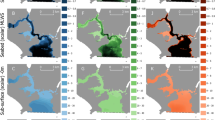Abstract
THE idea of ship-borne radar stimulating phosphorescence in the sea was first put forward by Captain F. G. Baker of M.V. British Premier in the Marine Observer (October 1952). The next case was the S.S. Strathmore, Captain J. M. Plaice, in the same journal (January 1954). This ship saw patches of light which flashed about once a second, though there was none of the usual small specks of phosphorescence in the ship's wake or bow wave. When the radar was switched off, the patches near the ship faded out, though some distant ones were still faintly visible. On switching the radar on again, the patches reappeared near the ship, but less brightly, and soon disappeared altogether. These reports were referred to authorities in England, including the Naval Weather Service and the Institute of Navigation. Their opinion was that it was most unlikely that radar could stimulate any phosphorescence in the sea, but invited more reports.
This is a preview of subscription content, access via your institution
Access options
Subscribe to this journal
Receive 51 print issues and online access
$199.00 per year
only $3.90 per issue
Buy this article
- Purchase on Springer Link
- Instant access to full article PDF
Prices may be subject to local taxes which are calculated during checkout
Similar content being viewed by others
Author information
Authors and Affiliations
Rights and permissions
About this article
Cite this article
HILDER, B. Radar and Phosphorescence at Sea. Nature 176, 174–175 (1955). https://doi.org/10.1038/176174a0
Issue Date:
DOI: https://doi.org/10.1038/176174a0
Comments
By submitting a comment you agree to abide by our Terms and Community Guidelines. If you find something abusive or that does not comply with our terms or guidelines please flag it as inappropriate.



